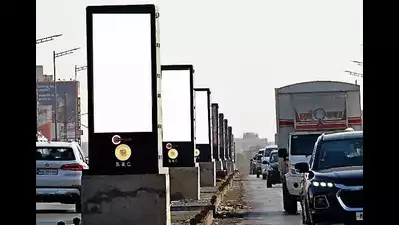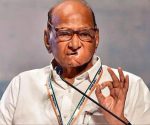Not ready to share hoarding revenue with BMC: MSRDC – The Times of India

Mumbai: The Maharashtra State Road Development Corporation (MSRDC) has maintained its stance of not sharing 50% of the revenue generated from outdoor advertisements on roads and other structures built by the corporation with the BMC. This was made clear during a hearing conducted by the BMC for suggestions and objections regarding BMC’s draft policy for the display of outdoor advertisements, which were submitted offline.
MSRDC had earlier informed the civic body of its opposition to sharing revenue. On Tuesday, MSRDC officials also pointed out that if the BMC insisted on a policy requiring the corporation to seek an NOC from the civic body before floating a tender for advertisement boards within the BMC-administered area, then the civic body would need to provide a definite time frame for granting NOCs. MSRDC officials also argued that there was no logic to the BMC’s demand for revenue sharing and referred to a state govt order in 2022, which exempted MSRDC from sharing revenue.
Activist Anil Galgali suggested that the BMC create a dedicated space for banners in 24 wards, including space for political, social, and religious advertisements, which would help reduce the number of unauthorized hoardings.
A committee appointed by the BMC had earlier unanimously stated that videos on digital hoardings along major traffic corridors, which have heavy vehicular movement, need to be restricted until a detailed study is carried out by IIT Bombay. Committee members also said that slide shows on digital hoardings should not be allowed and that digital hoardings need to be prohibited on road medians and traffic islands.
Sumaira Abdulali of the Awaaz Foundation during the last hearing had submitted documents of the advertisement policy in the UK, which restricts size, placement, and lighting of all public advertising displays, and the code and administrative rules for signs in Washington State, US, which restricts hoardings, particularly lighted hoardings.
The foundation also submitted a medical study on the effects of light pollution on human health, published by the National Library of Medicine, United States.
Mumbai: The Maharashtra State Road Development Corporation (MSRDC) has maintained its stance of not sharing 50% of the revenue generated from outdoor advertisements on roads and other structures built by the corporation with the BMC. This was made clear during a hearing conducted by the BMC for suggestions and objections regarding BMC’s draft policy for the display of outdoor advertisements, which were submitted offline.
MSRDC had earlier informed the civic body of its opposition to sharing revenue. On Tuesday, MSRDC officials also pointed out that if the BMC insisted on a policy requiring the corporation to seek an NOC from the civic body before floating a tender for advertisement boards within the BMC-administered area, then the civic body would need to provide a definite time frame for granting NOCs. MSRDC officials also argued that there was no logic to the BMC’s demand for revenue sharing and referred to a state govt order in 2022, which exempted MSRDC from sharing revenue.
Activist Anil Galgali suggested that the BMC create a dedicated space for banners in 24 wards, including space for political, social, and religious advertisements, which would help reduce the number of unauthorized hoardings.
A committee appointed by the BMC had earlier unanimously stated that videos on digital hoardings along major traffic corridors, which have heavy vehicular movement, need to be restricted until a detailed study is carried out by IIT Bombay. Committee members also said that slide shows on digital hoardings should not be allowed and that digital hoardings need to be prohibited on road medians and traffic islands.
Sumaira Abdulali of the Awaaz Foundation during the last hearing had submitted documents of the advertisement policy in the UK, which restricts size, placement, and lighting of all public advertising displays, and the code and administrative rules for signs in Washington State, US, which restricts hoardings, particularly lighted hoardings.
The foundation also submitted a medical study on the effects of light pollution on human health, published by the National Library of Medicine, United States.
















